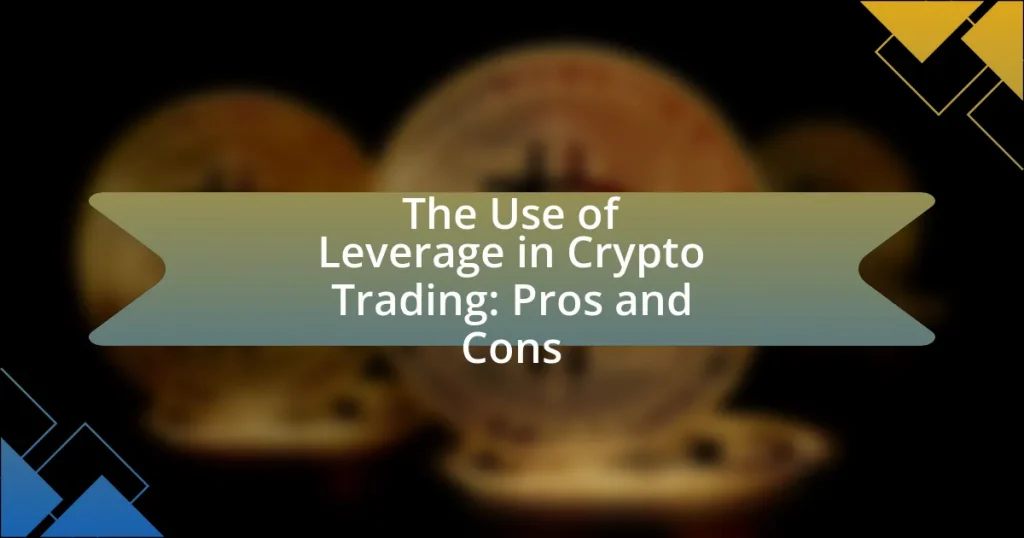The article focuses on the future of regulation for non-fungible tokens (NFTs) on crypto platforms, highlighting the anticipated increase in regulatory oversight and the establishment of clearer legal frameworks. It discusses the current regulatory landscape, including the classification of certain NFTs as securities by the U.S. Securities and Exchange Commission (SEC) and the implementation of anti-money laundering (AML) regulations. The article also examines the varying regulations across jurisdictions, the importance of consumer protection, and the potential risks posed by unregulated NFTs. Additionally, it outlines how future regulations could impact NFT creators and collectors, enhance market stability, and foster innovation while balancing the need for consumer safety.

What is the Future of Regulation for NFTs on Crypto Platforms?
The future of regulation for NFTs on crypto platforms is likely to involve increased oversight and clearer legal frameworks. Regulatory bodies, such as the U.S. Securities and Exchange Commission (SEC), have already indicated that certain NFTs may be classified as securities, which would subject them to existing securities laws. This trend is supported by the growing concern over consumer protection, market manipulation, and tax compliance, prompting governments worldwide to consider comprehensive regulations. For instance, the European Union is working on the Markets in Crypto-Assets (MiCA) regulation, which aims to create a unified regulatory framework for digital assets, including NFTs. As these regulatory measures evolve, crypto platforms will need to adapt their operations to comply with new legal requirements, ensuring transparency and accountability in the NFT market.
How are NFTs currently regulated on crypto platforms?
NFTs are currently regulated on crypto platforms primarily through existing securities laws and anti-money laundering (AML) regulations. Regulatory bodies like the U.S. Securities and Exchange Commission (SEC) have indicated that some NFTs may be classified as securities, depending on their characteristics and the context of their sale. For instance, if an NFT represents an investment in a common enterprise with the expectation of profits derived from the efforts of others, it may fall under the SEC’s jurisdiction. Additionally, crypto platforms must comply with AML regulations, which require them to implement Know Your Customer (KYC) processes to verify user identities and monitor transactions for suspicious activity. This regulatory landscape is evolving, as governments worldwide are increasingly focusing on establishing clearer frameworks for digital assets, including NFTs, to address issues related to consumer protection and market integrity.
What regulatory frameworks exist for NFTs today?
Regulatory frameworks for NFTs today primarily include securities laws, anti-money laundering (AML) regulations, and consumer protection laws. In the United States, the Securities and Exchange Commission (SEC) has indicated that certain NFTs may be classified as securities if they meet the Howey Test criteria, which assesses whether an investment contract exists. Additionally, the Financial Crimes Enforcement Network (FinCEN) requires NFT platforms to comply with AML regulations, ensuring that they report suspicious activities and verify user identities. Furthermore, various states have begun to implement consumer protection laws that address fraud and misrepresentation in NFT transactions. These frameworks are evolving as regulators seek to address the unique characteristics of NFTs while ensuring compliance with existing financial regulations.
How do these regulations vary across different jurisdictions?
Regulations for NFTs on crypto platforms vary significantly across different jurisdictions, reflecting diverse legal frameworks and cultural attitudes towards digital assets. For instance, the United States employs a fragmented regulatory approach, with states like Wyoming offering favorable laws for blockchain technology, while others, such as New York, impose stringent requirements under the BitLicense framework. In contrast, the European Union is working towards a unified regulatory framework through the Markets in Crypto-Assets (MiCA) proposal, aiming to create consistent rules across member states. Additionally, countries like China have imposed outright bans on NFT trading, while jurisdictions such as Singapore promote a more open regulatory environment, encouraging innovation in the blockchain space. These variations highlight the complexities and challenges faced by NFT platforms operating internationally, necessitating compliance with local laws and regulations.
Why is regulation important for NFTs on crypto platforms?
Regulation is important for NFTs on crypto platforms to ensure consumer protection and market integrity. Without regulation, users face risks such as fraud, lack of transparency, and potential loss of assets. For instance, the absence of clear guidelines can lead to misleading practices, as seen in cases where NFT projects have misrepresented their value or utility, resulting in significant financial losses for investors. Regulatory frameworks can establish standards for authenticity, ownership rights, and dispute resolution, thereby fostering trust and encouraging broader adoption of NFTs in the digital economy.
What risks do unregulated NFTs pose to investors?
Unregulated NFTs pose significant risks to investors, primarily due to the lack of consumer protections and the potential for fraud. Without regulatory oversight, investors face challenges such as market manipulation, where prices can be artificially inflated by unscrupulous actors. Additionally, the absence of clear ownership rights can lead to disputes over authenticity and provenance, making it difficult for investors to ascertain the true value of their assets. A report by the Financial Action Task Force highlights that the anonymity associated with many NFT transactions can facilitate money laundering and other illicit activities, further increasing the risk for investors.
How can regulation enhance consumer protection in the NFT market?
Regulation can enhance consumer protection in the NFT market by establishing clear legal frameworks that govern transactions and ownership rights. These frameworks can help prevent fraud, ensure transparency in pricing, and provide recourse for consumers in cases of disputes. For instance, regulations can mandate that NFT platforms disclose essential information about the assets being sold, such as provenance and authenticity, which can significantly reduce the risk of scams. Additionally, regulatory oversight can enforce compliance with anti-money laundering (AML) and know your customer (KYC) requirements, further safeguarding consumers against illicit activities. By creating a standardized approach to NFT transactions, regulation can foster trust and confidence among consumers, ultimately leading to a more secure and robust market.
What trends are shaping the future of NFT regulation?
Trends shaping the future of NFT regulation include increased government scrutiny, the establishment of clearer legal frameworks, and the push for consumer protection measures. Governments worldwide are recognizing the need to regulate NFTs to prevent fraud and ensure compliance with existing financial regulations, as evidenced by recent actions from the U.S. Securities and Exchange Commission, which has indicated that some NFTs may be classified as securities. Additionally, countries like the United Kingdom and members of the European Union are working on comprehensive regulations that address the unique aspects of NFTs, including intellectual property rights and taxation. Consumer protection is also becoming a priority, with calls for transparency in NFT transactions and the implementation of standards to safeguard buyers against scams and misinformation.
How are technological advancements influencing regulatory approaches?
Technological advancements are significantly influencing regulatory approaches by necessitating adaptive frameworks that address emerging challenges in digital environments. For instance, the rise of blockchain technology and NFTs has prompted regulators to develop guidelines that ensure consumer protection, prevent fraud, and promote transparency. The Financial Action Task Force (FATF) has issued recommendations for virtual assets, highlighting the need for compliance with anti-money laundering (AML) and counter-terrorism financing (CTF) regulations. Additionally, the rapid evolution of technology requires regulators to engage in continuous dialogue with industry stakeholders to create effective policies that balance innovation with risk management.
What role do industry stakeholders play in shaping regulations?
Industry stakeholders play a crucial role in shaping regulations by providing insights, expertise, and advocacy that influence policymakers. These stakeholders, including businesses, trade associations, and consumer groups, engage in lobbying efforts to communicate their interests and concerns, which can lead to the development of regulations that reflect industry needs. For instance, the Blockchain Association has actively participated in discussions with regulators to promote a balanced approach to cryptocurrency regulation, highlighting the importance of innovation while ensuring consumer protection. This engagement often results in regulations that are more informed and practical, aligning with the realities of the industry.
How might future regulations impact NFT creators and collectors?
Future regulations may impose stricter compliance requirements on NFT creators and collectors, affecting their operational practices and market dynamics. For instance, regulations could mandate transparency in ownership and provenance, requiring creators to disclose their identities and the origins of their digital assets. This could lead to increased accountability but may also deter some creators due to privacy concerns. Additionally, regulations might introduce taxation on NFT transactions, impacting the profitability for collectors and creators alike. According to a report by the Financial Action Task Force, the need for anti-money laundering measures in digital assets is becoming more pressing, indicating that regulatory frameworks will likely evolve to address these concerns.
What compliance challenges could NFT creators face?
NFT creators could face several compliance challenges, including regulatory scrutiny regarding securities laws, intellectual property rights, and anti-money laundering (AML) requirements. Regulatory bodies, such as the U.S. Securities and Exchange Commission (SEC), may classify certain NFTs as securities, which would impose registration and disclosure obligations on creators. Additionally, creators must navigate complex intellectual property laws to ensure they do not infringe on existing copyrights or trademarks when minting NFTs. Furthermore, compliance with AML regulations is crucial, as creators must implement measures to prevent illicit activities, which can include verifying the identity of buyers and tracking transactions. These challenges highlight the need for NFT creators to stay informed about evolving regulations and seek legal guidance to mitigate risks.
How could regulations affect the value of NFTs for collectors?
Regulations could significantly impact the value of NFTs for collectors by introducing legal frameworks that enhance market stability and consumer protection. When regulations clarify ownership rights, intellectual property issues, and tax obligations, they can increase collector confidence, potentially driving demand and prices higher. For instance, the implementation of clear guidelines by regulatory bodies, such as the U.S. Securities and Exchange Commission, can legitimize NFT transactions, making them more attractive to mainstream investors. Historical examples, like the regulation of cryptocurrencies, show that increased oversight can lead to greater market participation and price appreciation.
What are the potential benefits of a regulated NFT market?
A regulated NFT market can enhance consumer protection, ensuring that buyers and sellers engage in fair transactions. Regulation can establish clear guidelines for ownership rights, reducing the risk of fraud and intellectual property theft, which has been a significant concern in the unregulated space. For instance, a study by the World Economic Forum highlights that regulation can foster trust among participants, leading to increased market participation and investment. Furthermore, a regulated environment can facilitate the integration of NFTs into traditional financial systems, allowing for better liquidity and valuation methods, ultimately contributing to market stability.
How could regulation foster innovation in the NFT space?
Regulation could foster innovation in the NFT space by providing a clear legal framework that encourages investment and development. When regulations are established, they can reduce uncertainty for creators and investors, leading to increased participation in the market. For instance, the introduction of intellectual property protections can incentivize artists to create and sell NFTs, knowing their rights are safeguarded. Additionally, regulatory clarity can facilitate partnerships between traditional businesses and NFT platforms, as companies are more likely to engage in collaborations when they understand the legal implications. This has been observed in sectors like gaming and art, where regulatory guidelines have led to the emergence of new business models and revenue streams.
What advantages would a regulated market provide to mainstream adoption?
A regulated market would enhance mainstream adoption by providing increased consumer protection and fostering trust among users. Regulation ensures that transactions are secure, reducing the risk of fraud and scams, which is crucial for attracting a broader audience. For instance, according to a 2021 report by the Financial Action Task Force, regulated environments can significantly lower the incidence of illicit activities, thereby making the market more appealing to mainstream users. Additionally, clear regulations can facilitate easier access to financial services and create a standardized framework for transactions, further encouraging participation from traditional investors and businesses.
What are the key considerations for policymakers in NFT regulation?
Key considerations for policymakers in NFT regulation include consumer protection, market integrity, and intellectual property rights. Policymakers must ensure that consumers are safeguarded against fraud and scams, as the NFT market has seen significant instances of misleading practices. Additionally, maintaining market integrity is crucial to prevent manipulation and ensure fair trading practices, as evidenced by the volatility and speculative nature of NFT prices. Intellectual property rights must also be addressed, as NFTs often involve the sale of digital assets that may infringe on copyright or trademark laws, necessitating clear guidelines to protect creators and rights holders.
How can policymakers balance innovation and consumer protection?
Policymakers can balance innovation and consumer protection by implementing adaptive regulatory frameworks that encourage technological advancement while safeguarding consumer rights. These frameworks should be flexible enough to accommodate rapid changes in technology, such as those seen in the NFT and crypto markets, while establishing clear guidelines that protect consumers from fraud and misinformation. For instance, the European Union’s MiCA (Markets in Crypto-Assets) regulation aims to create a comprehensive regulatory environment that fosters innovation in the crypto space while ensuring consumer protection through transparency and accountability measures. This approach demonstrates that effective regulation can support innovation without compromising consumer safety.
What lessons can be learned from other regulated digital assets?
Lessons learned from other regulated digital assets include the importance of compliance frameworks, the necessity for transparency, and the value of consumer protection measures. For instance, the regulation of cryptocurrencies like Bitcoin and Ethereum has highlighted the need for clear guidelines to prevent fraud and ensure market integrity. The Financial Action Task Force (FATF) has established standards that require digital asset service providers to implement anti-money laundering (AML) practices, which can be applied to NFTs as well. Additionally, the experience with stablecoins, such as Tether, demonstrates the significance of maintaining reserves and providing regular audits to build trust among users. These examples underscore that effective regulation can enhance legitimacy and foster innovation in the digital asset space.
What practical steps can NFT platforms take to prepare for future regulations?
NFT platforms can prepare for future regulations by implementing robust compliance frameworks that include Know Your Customer (KYC) and Anti-Money Laundering (AML) procedures. These frameworks help platforms identify and verify the identities of their users, thereby reducing the risk of illicit activities. For instance, the Financial Action Task Force (FATF) has recommended that virtual asset service providers, including NFT platforms, adhere to these measures to prevent money laundering and terrorist financing. Additionally, NFT platforms should stay informed about evolving regulatory landscapes by engaging with legal experts and participating in industry associations, which can provide insights into upcoming regulations and best practices. This proactive approach not only ensures compliance but also builds trust with users and regulators alike.















